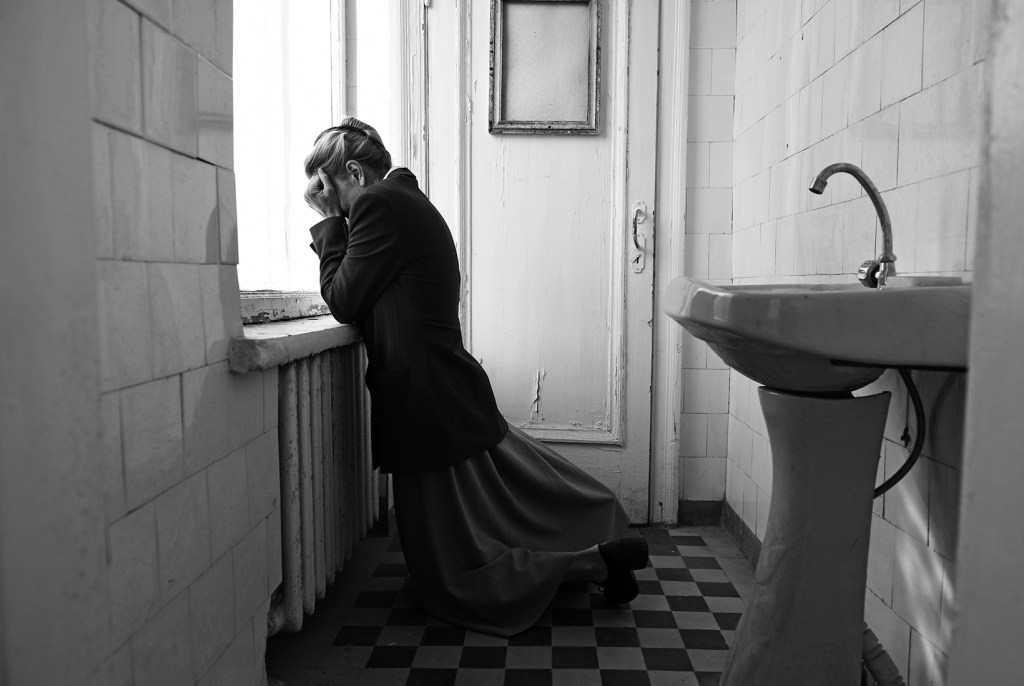Andrei Konchalovsky’s Dear Comrades! is based on a true event and set in 1962 in the Russian city of Novocherkassk where the local factory, the Novocherkassk Electric Locomotive Plant, went on strike. This doesn’t sound especially sexy, I know, but it is superbly acted and so rivetingly told my concentration did not waver for an instant which, given how hard it has been to concentrate lately, is high recommendation indeed. (It wouldn’t be fair to list the films I couldn’t concentrate on, as the problem is likely mine, but…Mank!)
Konchalovsky certainly has a wild résumé. He has worked with Tarkovsky. He made the wonderfully hypnotic The Postman’s White Nights, about a remote Russian village whose only contact with the outside world is their postman. But there’s also his Nutcracker (in 3D), a crazed biopic of Michelangelo, and Tango & Cash, the American cop action comedy starring Sylvester Stallone. Still, good for him. He probably got a nice dacha out of Tango. (Or Cash.) But Dear Comrades! is nothing like any of the above and feels like what, as an auteur, he’s always been striving towards, although whether Stallone was integral to the process, I can’t say.
This is filmed in stark black and white, presumably to mimic the style of (heavily censored) Soviet films of that time. It immediately takes you back to that era, plus it is startlingly beautiful. At its center is a spellbinding performance from Yuliya Vysotskaya as Lyuda, a committed party bureaucrat. She is head of sector for the town’s City Committee, and has a rebellious 18-year-old daughter (Yuliya Burova) and a limping old father (Sergei Erlish) who isn’t exactly a joy to be around. (‘Glad I’ll be dead soon…’). Lyuda is blonde and attractive but not soft or sentimental. You understand immediately that she has been hardened by what she’s had to believe to get by. She believed in and still believes in Stalin and remembers him fondly. Stalin knew what was what. Stalin was basically one purge away from creating a communist utopia. (She doesn’t actually say that, but as good as.) And he kept food prices low. But now they are rising under his successor, Nikita Khrushchev, whom she sees as dangerously liberal. But she’s still a good communist and accepts it when the Central Committee says the hikes will ‘result in higher living standards in the nearest future’. However, when wages at the factory are cut, and the workers down tools and march on the town square, she’s sent into a total spin.
***
Get a print and digital subscription to The Spectator.
Try a month free, then just $7.99 a month
***
As are the rest of the town’s committee. At first, this plays like a Death of Stalin satire as all the local party honchoes show themselves up as ridiculous and try to shift the blame. But then Moscow becomes involved, and the KGB and the military, and what follows is something that Russia actually managed to keep hidden for the next 30 years. Shockingly, there was a massacre, filmed stomach-churningly here. I’d wondered if disclosing that was a spoiler, but it happens quite early on, and this is more about the ramifications for Lyuda, whose daughter goes missing. Her daughter worked at the factory and held views that opposed her mother’s. Was she one of the strike’s ‘instigators’? Is she dead?
Fascinatingly, Lyuda must now negotiate the Kafka-esque bureaucracy and form-filling that had previously benefited her. She must also negotiate a morgue where the bodies don’t add up, and the rooms where the town’s remaining citizens are being forced to sign ‘declarations of secrecy’ so news of what happened in Novocherkassk can’t spread. (The USSR is meant to be ‘a worker’s paradise’, remember.)
I have made it sound grim and dour and depressing but the storytelling is fantastically propulsive and while Lyuda is not especially likable, you empathize with her mounting desperation and horror at the system she had helped create. The end is abrupt and not what you’d expect, and possibly a cliché, but might this also be in keeping with the (heavily censored) Soviet films of the time? Whatever, I didn’t look up once during the two hours. Unlike another film I could mention…
This article was originally published in The Spectator’s UK magazine. Subscribe to the US edition here.


















